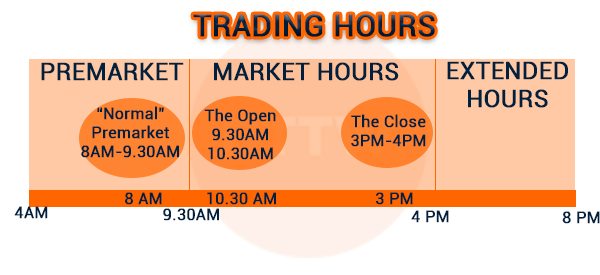Day trading is one of the most popular approaches of making money online. It involves buying and selling financial assets like stocks, currencies, commodities, and cryptocurrencies with the goal of generating a profit.
In most periods, traders buy and hold assets within a short period, often less than ten minutes. This is not to say that your trading day is limited to just those 10 minutes. There is a lot of research and analysis behind it, with those being a full-fledged part of your job!
In this article, we will answer a common question on how many hours that a day trader should work.
Table of Contents
Trading vs investing
Day trading is significantly different from investing. In day trading, the market participant has a shorter holding horizon. Their goal is to buy and sell assets within a few minutes. As such, these traders need to spend more time trading on a daily basis.
On the other hand, investors have a longer horizon, where they buy and hold assets for a long period. As such, most investors don’t necessarily need to spend a lot of time every day. In fact, it is well-known that many investors spend an entire year without making an investment.
Related » Value Investor VS Trader
The two models can be profitable to participants. For example, Warren Buffett, who makes a few investments every year, has become one of the most successful investors in the world.
Similarly, some day traders, especially in companies like Jane Street have become extremely successful over the years.
Types of day traders
In trying to determine the number of hours that one should spend in day trading, it is important to note the two types of day traders.
First, there are people who day trade on a full-time basis. These are people who make money solely from day trading. These people will often spend most of their days trading.
Second, there are those who day trade on a part-time basis. These are people who have their 9-5 jobs but want to make money day trading on the side. These ones will typically spend a few hours day trading.
The two approaches can be successful. In fact, in some cases, part-time traders tend to have more success than full-time traders.
Day in the life of a full-time day trader
The schedule of a day trader will always depend on a few factors like the financial assets they are trading and their trading style.
For example, day traders who focus on forex have more hours to trade since the forex market is usually open for 24 hours a day. The same is true for crypto traders, who have access to data on a daily basis. Stock traders, on the other hand, have a small window to day trade on a daily basis.
A typical stocks day trader has a similar schedule every day. First, they spend some time every morning looking at the top news of the day. This involves looking at news that broke in the overnight session and their impact in the market.
Premarket and first hour
Second, they look at the happenings in the premarket session. This is a period that happens between 8:00 A.M and 9:30 A.M.
The premarket period can provide them with information on the best and worst-performing stocks in the market. In some cases, traders focus on these stocks, especially those with higher relative volume.
Day traders also prefer to open their positions in the first half hour/hour after the markets open, taking advantage of the high volatility and gaps occurred overnight.
They often generate much more profit in this time frame than in the middle hours of the day. If you don’t want to spend 8 hours in front of your trading software, this is a time to capitalize.
Trades needed for your style
Third, they then start doing analysis on the stocks they are interested in. This analysis can be brief or take some time, depending on their expertise.
Scalpers can take advantage of short movements to initiate multiple trades per hour. This approach forces those who adopt it into long trading sessions to spot as many opportunities as possible.
On the other hand, swing traders tend to initiate a few trades per day. For day traders, on the other hand, the time horizon is the end of the day.
Market conditions
Other times we have to consider market conditions. Although we have strategies that allow you to generate profits in any case (if implemented well, of course), at some times/some days, it might be a good idea to stay out of the market.
In short, forced trading is never a good idea. If the asset does not reflect what you had included in your trading plan and you are not convinced, do not open the trade. You only risk throwing your money away.
The closing and extended hours
Finally, day traders tend to follow the maket closely until the regular session ends. As for the opening, the closing is a major part of the trading day because it features a lot of volatility and opportunities to open small trades or close one’s positions.
Some traders continue trading during the extended hours, although this can only be addressed with limited tools.

Other tips
In addition, traders do other things during the trading day. This include:
- Take meal breaks – In most cases, many traders take breaks during the trading session. This includes during the tea and lunch breaks.
- Committee meeting – For traders in floors, they often take part in committee meetings where they deliberate on key events.
- Client meetings – For hedge fund managers, they can take time for client meetings, where they talk about their performance.
- Take care of your health: we include here both physical, by doing sports, and mental health, with meditation or yoga.
Hours day traders work
A common question, therefore, is on the number of hours that traders work each day. The right answer to this is that it depends on the type of trader and the strategy they use.
Many part-time traders tend to spend less than one hour trading. On the other hand, full-time traders tend to spend more time trading on a daily basis (between two and five hours).
It is worth noting that there is often no correlation between the number of hours that traders use and their performance. At times, part-time traders tend to do better than full-time traders. It all depends on your skills and to a small extent, luck.
How to improve your trading day
There are several things that you can do to improve your trading day. Some of these are:
- Have a trading journal – A journal is a document where you write all information about your trades. In most periods, this journal can save your time by avoiding some of your time-consuming tasks.
- Use time-saving tools – You can save a lot of time using some time-saving tools like a watchlist and a scanner.
- IT – Invest in high-quality IT hardware like computer, smartphone, and internet. At times, people waste a lot of time because of slow hardware.
- Take breaks – Ok, we already told this, but it is really something important and often underrated. You should always take breaks in your trading. These breaks will help you save time and boost your mental status.
Summary
In this article, we have sought to answer the important question on the number of hours you should spend in your trading.
The answer is that it all depends on the type of trader that you are. If you are a full-time day trader, you will take more time compared to when you are a part-time trader.
Anyway, we need to emphasize that day trading is not easy, and you will hardly be able to generate huge profits by working a minimum of time. Or, at least, not at the beginning of your career. The important thing is to be consistent in your efforts and diligent.
External useful resources
- How many times can investor trade per day? – Quora





